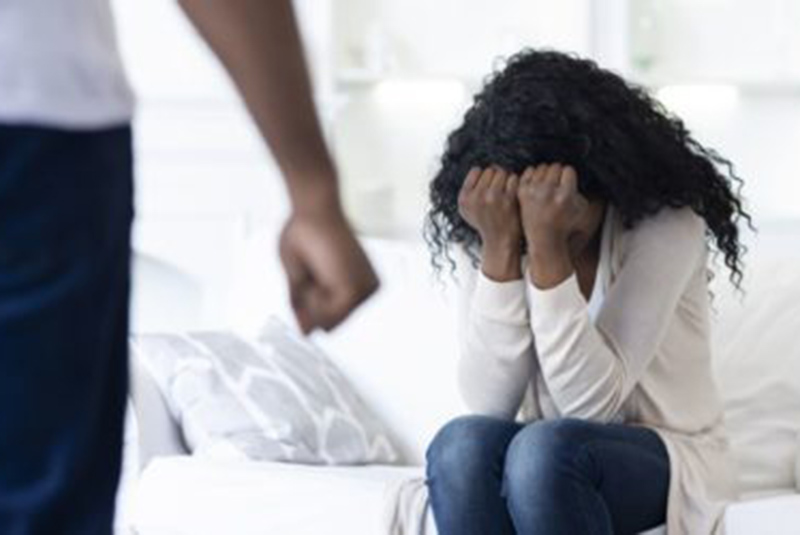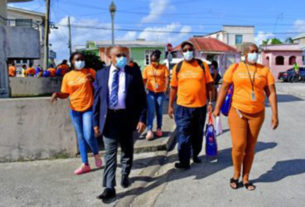(Stock Photo)
In the first two quarters of 2020, which included the COVID-19 lockdown period, Barbados saw an increase of about 83 per cent in reported incidents of domestic violence.
This was revealed yesterday by Representative with UN Women Multi Country Office, Caribbean, Tonni Brodber as she addressed the Ministry of Labour and Social Partnership Relations’ launch of the Gender-based Violence (GBV) In the Workplace Project, in partnership with her organisation, on the Zoom platform.
Ms. Brodber noted that 243 million women and girls, aged 15 to 49, had been subjected to sexual and or physical violence by an intimate partner within the last year.
And, while she pointed out that in Caribbean countries that have prevalence data, it ranged from 1 in 2 women in Guyana, to 1 in 10 in Grenada, she added: “We know that reports across the OECS have increased during the lockdown and that Barbados, in particular, experienced an approximately 83 per cent increase in reported cases of domestic violence, many of which were intimate partner violence.”
She also noted that in March 2020, there was a 125 per cent increase, and in April 2020, an 88 per cent increase, indicating a trend.
“We know that reports across the OECS have increased during the lockdown and that Barbados, in particular, experienced an approximately 83 per cent increase in reported cases of domestic violence, many of which were intimate partner violence.”
Representative with UN Women Multi Country Office, Caribbean, Tonni Brodber
Ms. Brodber stressed that the data, though based on two quarters, said a lot about the COVID-19 lockdown and the associated employment, family and overall well-being, burdens and responses.
Outlining it had implications for the world of work, the UN official noted that research demonstrated that domestic violence presents a significant cost to employers and the economy overall, amounting to billions of dollars in many countries.
Pointing out that survivors tell of stories of partners approaching their work places, stalking and undermining their independence and relations with colleagues and bosses, she said the murders of women, as a result of gender-based violence, occurred at workplaces in two Caribbean countries.

She said in 2018, in Barbados, a 36-year-old woman was fatally stabbed by her estranged partner, and in 2020, in Trinidad and Tobago, a man, who was separated from his wife, murdered her in the parking lot of her workplace.
“Leaving does not mean the abuse ends. It is in fact the most dangerous time for a victim or a survivor. Perpetrators target victims’ workplaces because generally they know they will find them there and employers bear some of the burden of intimate partner violence, including lost productivity, medical care and mental health services.”
To this end, the Head of UN Women called for a review of related laws to ensure there existed adequate family and medical leave laws that require employers to grant leave to employees coping with domestic violence situations.
“Leaving does not mean the abuse ends. It is in fact the most dangerous time for a victim or a survivor. Perpetrators target victims’ workplaces because generally they know they will find them there and employers bear some of the burden of intimate partner violence, including lost productivity, medical care and mental health services.”
Representative with UN Women Multi Country Office, Caribbean, Tonni Brodber
Meanwhile, Minister of Labour and Social Partnership Relations, Colin Jordan, who explained that gender-based violence included any type of violence or harassment directed towards a person because of that person’s gender, said.
“We know that violence and harassment in the workplace and in the wider world of work has the potential to affect a person’s psychological, physical or sexual health, their dignity and family and social environment, and then this can negatively impact their productivity.”
Admitting that legislation, while good on the books, made no sense if people did not know of its existence, Mr. Jordan, told the virtual gathering of public, private and non-governmental and union representatives, that the GBV in the Workplace Project would help to reach the wider public, including “those who work to get a knowledge of the legislation and the protections that are in place to assist all of us”.
JOY-ANN ILL — BGIS
XXXXXXXXXXXXXXXXXXXXXXXXXXXXXXXXXXXXXXXXXXXXX
New Anti-Violence Project Requires Collaboration
JOY-ANN ILL — BGIS

The overall success of Government’s Gender-based Violence (GBV) In the Workplace Project, being undertaken in collaboration with UN Women, will depend on various partners recognising its importance and working together to eliminate violence and harassment in the world of work.
This message was conveyed by Minister of Labour and Social Partnership Relations, Colin Jordan, as the two-year project was launched yesterday on the Zoom platform, in the presence of representatives from public, private, non-governmental and trade union organisations.
Urging persons not to become desensitised to the evil that is gender-based violence, Minister Jordan said: “We have engaged our stakeholders, including faith-based organisations, businesses, workers’ unions, workers, directly and women’s and men’s groups. We know that the elimination of gender-based violence and harassment needs a multi-faceted response that includes all sectors and agents of the society.”
Lauding the commitment of UN Women to partner with Government to put the issue on ‘the front burner’, the Labour Minister stressed he was also heartened that key stakeholders in the public, private and the third sectors participated in the official launch, and would be crucial in the project’s execution.
He noted that the design of a tool kit and training programmes would be collaboratively developed, and would focus on how such violence impacts the cultural and work environment.
“We will develop strategies to ensure that the message reaches groups in our society who may be marginalised and disadvantaged, and whose voices are not being heard,” he stated.
Speaking about the charter to be established, he stressed it would seek endorsement at the level of the Social Partnership because Government wanted everybody to be on board.
“Barbados is well known for its social dialogue and we believe that for this project to be effective in reducing and ultimately eliminating violence and harassment in the world of work, then all sectors of society need to be on board. We need a change in the culture.
“With training, we can overcome all the obstacles and we are hoping therefore that through the signing of this charter, we will have a commitment at the governmental, organisational and at the individual level. And this is going to be an important aspect of this project,” the Labour Minister said.
JOY-ANN ILL — BGIS




